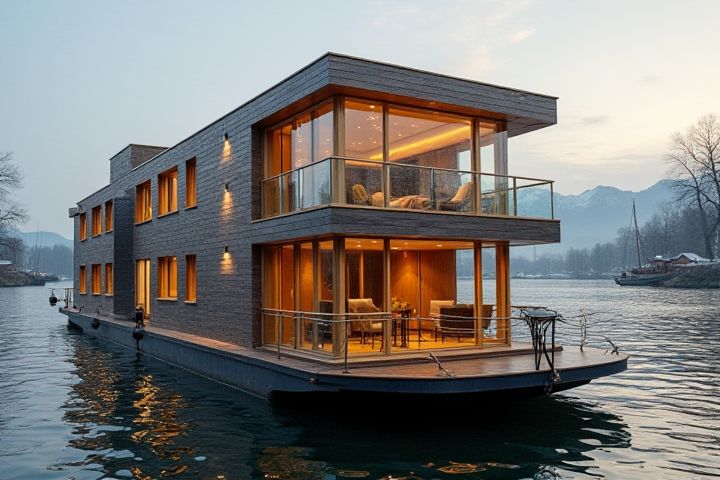
A houseboat can be a viable residence, offering a unique lifestyle that blends aquatic living with the comforts of a traditional home. Many modern houseboats are designed with amenities such as kitchens, bathrooms, and spacious living areas, making them suitable for year-round habitation. Depending on location, houseboat living can provide scenic waterfront views and a tranquil atmosphere, often reducing stress associated with urban environments. Considerations like mooring costs, maintenance, and local regulations are essential for potential residents. Transitioning to this lifestyle allows you to embrace a close-knit community with fellow boaters and enjoy water-based recreational activities.
Is A Houseboat A Viable Residence
Location regulations
Houseboats can serve as a unique and viable residential option, particularly in areas where local regulations support their use. In many coastal regions, marinas or designated houseboat communities often have specific zoning laws governing houseboat living, which may include permits, waste management requirements, and safety codes. It's essential to research the city or county regulations in your desired location, as some areas may restrict houseboat occupancy to certain waters or impose limits on the length of stay. Your choice of a houseboat as a residence should align with local ordinances to ensure compliance and an enjoyable living experience.
Costs and maintenance
A houseboat can be a viable residence, particularly if you prioritize cost-effectiveness and minimal maintenance. Monthly expenses typically include dock fees, insurance, and utilities, which can be lower than traditional homeownership. Maintenance costs may involve regular hull inspections, cleaning, and plumbing checks due to constant water exposure, but many owners find this manageable. You should also consider potential repairs from wear and tear influenced by weather conditions, which can affect your overall budget.
Space limitations
A houseboat typically offers between 200 to 400 square feet of living space, making it ideal for minimalists or those who prefer a simpler lifestyle. Space limitations require efficient storage solutions, such as built-in furniture and multi-functional areas, to maximize usability without clutter. It's essential to consider local regulations and water conditions, as they can impact your ability to dock and live continuously on the water. When opting for a houseboat, you must also account for utilities like water and electricity, which can significantly influence your overall living experience.
Utility access
Living on a houseboat can offer unique benefits, but utility access is a critical factor to consider. Most houseboats come equipped with essential utilities such as electricity, water, and sewage systems, although availability may vary by location. For example, marinas often provide shore power connections that ensure a reliable electricity supply, whereas fresh water access might require a water tank refill schedule. You should also investigate local regulations, as some regions have strict guidelines regarding waste disposal and utility connections for houseboats.
Insurance requirements
A houseboat can serve as a viable residence, but insurance requirements differ significantly from traditional homes. Most homeowners' insurance policies do not extend to houseboats, requiring specialized marine insurance that covers both the structure and your personal belongings. You need to consider liability coverage, which protects you in case of accidents involving your houseboat. Additionally, ensure that your policy addresses any potential risks associated with living on the water, including flooding and environmental factors specific to your location.
Safety considerations
Living on a houseboat presents unique safety considerations that must be addressed for a secure lifestyle. Your houseboat should be equipped with essential safety features, including smoke detectors, carbon monoxide detectors, and fire extinguishers, which are crucial for early detection of hazards. Additionally, securing proper flotation and stability measures is vital to prevent capsizing, while ensuring that all electrical systems comply with maritime safety standards is imperative. Regular maintenance, such as hull inspections and checking life-saving equipment, contributes to a safer living environment on the water.
Lifestyle adjustments
Living on a houseboat involves significant lifestyle adjustments that can enhance your appreciation for water-based environments. You'll need to adapt to limited space, which encourages minimalist living and prioritization of essential belongings, ultimately fostering a more organized lifestyle. Additionally, managing daily tasks such as water supply, waste disposal, and maintaining stability can cultivate a stronger connection with your surroundings. Embracing the rhythmic ebb and flow of water fosters mindfulness, transforming everyday routines into serene experiences that promote relaxation and well-being.
Resale value
A houseboat can represent a unique living experience, but its resale value often fluctuates based on various factors, such as location and market demand. Properties in popular waterfront areas can appreciate significantly, with some houseboats selling for upward of $300,000, while others in less desirable locations may lag at around $100,000 or less. Potential buyers often prioritize features like amenities, size, and navigability, influencing resale prospects. To maintain a competitive resale value, consider regular maintenance and updates that appeal to prospective buyers.
Environmental impact
Houseboats present a unique residential option, often resulting in reduced land use and minimal habitat disruption compared to traditional homes, preserving natural ecosystems. Constructing a houseboat using sustainable materials can lower your carbon footprint, while energy-efficient systems like solar panels can significantly reduce reliance on fossil fuels. Water-based living also encourages a more sustainable lifestyle, promoting conservation of marine resources and minimizing waste. However, waste disposal and water pollution remain critical considerations, emphasizing the need for responsible practices to mitigate environmental impacts.
Mooring logistics
Mooring logistics for a houseboat can vary significantly based on location, with costs ranging from $250 to $1,500 monthly. Key considerations include accessibility to essential services such as water, electricity, and waste disposal, which can influence your overall living experience. Additionally, local zoning regulations and permits may affect where you can dock your houseboat, so it's crucial to research these factors in advance. For long-term viability, securing a stable and well-equipped mooring site is essential to ensure comfort and convenience in daily living.
